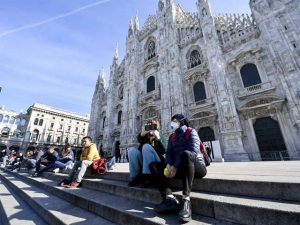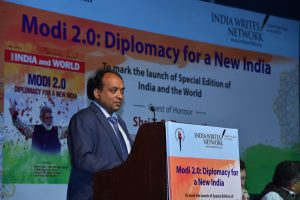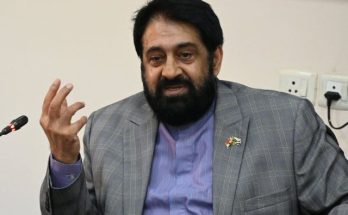
The handling of the coronavirus pandemic has sparked competitive posturing and one-upmanship between the world’s top two economies, which continue to engage in a never-ending war of words over the origin of the virus. Besides the overt US-China rivalry, the aftereffects of the pandemic have also sharpened geopolitical tensions, fuelling speculation about convulsions in the existing world order.

Against this backdrop, Dr Frank-Jurgen Richter, Founder and Chairman of Horasis, a global visions community focused on creating a platform for cooperation between emerging and developed markets, advises all countries to focus on managing their own recovery as best as they can as geopolitical posturing between China and the US will continue for quite some time. “To criticise another nation without evidence is a somewhat unsatisfactory situation when we really need global cooperation,” he says.
In this wide-ranging conversation with Manish Chand, CEO & Editor-in-Chief, India and World & India Writes Network, Dr Richter, author, commentator and a former director of the World Economic Forum, speaks about diverse issues linked to the pandemic, including prospects of a recovery, the imperative for resourcing and reforming global institutions of governance and India’s strengths in pharmaceutical sector which could not only aid its recovery but also that of the world.
Q & A
Q) The coronavirus pandemic has triggered geopolitical tensions and rivalries between rival powers. How do you see this new post-pandemic power game playing out?
A) Well, before the Covid-19 pandemic surfaced there were global geo-political tensions as nations jostled to re-position themselves economically. Perhaps the greatest of these tensions have arisen from the US Administration’s belief that all other nations are (economically) attacking its sovereignty. And yet, even before we noted their pressures on certain nations to ‘behave’ in the ways wanted by the US, we have seen the World Trade Organisation (WTO) adjudicate on individual nations concerning others about unfair practices – dumping of steel, tyres, and so on. As the WTO has often taken a long time to come to a decision, the US has taken upon itself to criticise and blocked staff appointments resulting in the appellate body of the WTO becoming inquorate.
Subsequently, the ‘America First’ agenda continued almost unopposed – though Japan and the EU have attempted to set new global rules on state subsidies and forced technological transfers: China, too, has published its own reform proposals – so on this front, the commercial world is stymied. There are extremely debilitating steel, aluminium and other tariffs imposed by the US on the EU, some on India, and strong tariffs imposed on China. Retaliatory tariffs have been imposed on the US. None of these bode well for global economic recovery post-Covid.
The development of the Covid-19 virus effects took some time to become noted. It is a novel virus and the medical profession did not recognise it – they probably mis-diagnosed it initially therefore letting it re-transmit rapidly. That effect would have been seen in China initially, but all doctors across the world had to be trained to recognise the symptoms as there was (and is) not an effective test for the virus. The only effective treatment regime is self-isolation – but even that is questioned, as different nations have taken different routes to the virus containment. And, compounding the complexity, there is no vaccine available yet; nor for the foreseeable future – despite many ‘authorities’ claiming otherwise.
The management of the spread of Covid in the US has led to the US President accusing China of manufacturing the virus, or withholding information of its virulence – essentially implying China is attacking the US. In these times of severe global stress such posturing is unhelpful.
I, therefore, see the pandemic’s effects probably continuing over two years (such is the current scientific advice) so the geopolitical posturing between China and the US will continue as there can be no resolution until both nations agree to a very detailed epidemiological analysis; and they are presently unwilling. It is therefore incumbent of the governments of each nation to manage their own recovery as best as they can; absorbing the best scientific knowledge and buying (or developing) vaccines as best as they can. To criticise another nation without evidence is a somewhat unsatisfactory situation when we really need global cooperation.
Q) Do you see a new world order emerging out of the ravages of the pandemic? What will be defining features of this post-pandemic world order?
A) In brief, your question is very difficult to answer. Most governments face accusation by their opposition parties of “… not having done enough”. But that is the wont of opposition parties. Some populist parties are attempting to overthrow the incumbent government parties by inciting the people to riot “… for better treatment”. And others, especially in the emerging nations space, have disastrous economies at present due to the three pressures – falling demand for their goods, falling oil prices (if they are selling oil) and the onset of COVID against which they are not well provisioned throughout their health care sector. Overall, I see governments, in the short term, fighting the ravages of the global economic and health crisis without too much change in the ‘world order’. But when those two main issues stabilise there might be some rearrangement.
First, and an unknown, the treatment of COVID and the application of a vaccine depends on scientific developments and well organised testing. Once that, via the WHO, has been stabilised all nations can concentrate more on their economic recovery. And this is a ‘chicken and egg’ situation – there is little demand to purchase goods because there has been restricted supply and because people feel poor due to being furloughed. China, for several decades, known as the assembly site for the world has little global demand for its production, and so its workers are paid little and we observe a potential downward economic spiral – and the same goes for populous India: how to stimulate its economy when people still suffer mentally from Covid and its lockdown?
The world order changes slowly if there are no massive wars. But over recent decades we have seen fairly constant global growth, with the largest effects seen in the emerging markets sectors. But through this time the US dollar has been the supreme reserve currency and the Euro has not overtaken it. But in terms of the market size, Europe has achieved a critical mass and for many exporters the EU is their main export region. We have seemed reasonably fixed to maintain the northern hemisphere with the US, EU and Asia as the economic power houses, notwithstanding the shuffling inside Asia as India’s economy rose quickly.
Much of the rearrangement thesis depends on the positioning of the observer. But, being realistic, though with old data, we cannot but notice that the economies of many nations remain weak and that only the top few are noticeable. Taking World Bank (2018) data, these are US, China, Japan, Germany, UK with India ranking 6th. It is almost inconceivable that the Russian Federation (10th) with a GDP of $ 1.66 trillion would rapidly rise to threaten the US (1st) with a GDP of $20.54 trillion: similar arguments might take place up and down the World Bank list. However, it notes that the global growth is projected to be only 2.5 percent in 2020. What it cannot predict is any conflagration that might set nation against nation, and thus wreak our present global stability and growth, slow though that might be.
Q) The G7 countries, specially Europe, have been badly impacted by the epidemic? How soon can Europe recover from the pandemic and its economic fall-out?

A Your question really refers to the G4 – France, Germany, Italy, UK, and to some extent the rest of the smaller (economically) EU countries: the others are Canada, Japan and the US. The G7 by the way covers 58 percent of global wealth and 46 percent of global gross domestic product. Yes, the European nations have been strongly affected by COVID-19. One of its transmission routes seems to have been from China, to Austria, to Italy and then an ‘explosion of transmission’ to the other nations. Presently they are recovering and yet worrying about a second wave of infections: one of the major effects concern the mentality of its citizens due to the lock down: they suggest they are frightened to leave their homes. Unlike India, in its massive cities, Europe lives with space: families could socially-distance themselves at home. They have suffered conflicting news stories – some fake, others simply emphasising the unique aspects of Covid and the need to collect data – for testing, for treatment and later for vaccination management. Naturally, venturing out to work is perceived as a little dangerous.
The recovery of the EU and across the globe, depends on good management of Covid and its potential return next winter and so on. And recovery also depends on the joint recovery of supply and demand: not only of prime goods, but also on the many supply chains that will reinvigorate lower tier supply firms. The tariff issues perturbed supply chains, cutting primary forms and their supply tiers, but due to Covid, demand for many products ceased suddenly. It will take time to wind up all our economies. In the case of the EU it will take from six months to a year to begin to stabilise.
It is not only the immediate supply and demand (and labour management) that is of concern, but central banks have given out vast stimulus loans that will have to be paid back: in a sense, firms will have to work twice as hard, in a world where demand and supply is weak.
Q) The pandemic has underscored the imperative for enhancing global cooperation and multilateralism. But at the same time, global institutions have not been found to be adequate in addressing crisis of this magnitude? What’s the way ahead?
A) The simplest solution is to adequately resource the institutions. A similar effect is seen in many firms – when business runs smoothly there is little incentive to fund departments that are needed in a crisis – then it is too late; and even worse, the firms may not have the cash to lift funding for their crisis management.
The global institutions of IMF, World Bank, the UN and its agencies were set up many decades ago in response to problems that have, by and large, been resolved. But global problems surface which need independent reviewers of suitable calibre. Too few staff restrict the progress of research and adjudication. And less well qualified staff risk confrontation in the arbitration courts as multi-national firms or even nations can afford the best negotiators.
The answer is to lift resource levels; however, nations contributing to the financing of the institutions consider they have a say in the staff employed. And sometimes they refuse to permit the recruitment of staff – as in the case of the US vs. the WTO, and more recently the WHO. By reducing the capabilities of an institution, the US can say it is ‘not working’ and simply undertake a bilateral negotiation on its own terms.
The way ahead could be simple – demand every nation pays a fair share of the costs of the Institution or Agency. And demand the Agencies review their working practices and technological support to ensure efficiency. Ultimately a plaintive nation should see that its pleas are rejected or accepted approximately 50/50 if the institution is working well, that is, the institution is not biased – and the pleas are dealt with in a timely fashion.
Q) How do you see the role for India in addressing the coronavirus pandemic? How do you see the role of India in the post-pandemic world order?

A) Before the onset of the Covid pandemic, it was recognised that India had a strong health and pharmaceutical sector, including natural remedies. Its medical mechanics were advanced, and its technical prowess in operations was also effective. Backing these up were world-class manufacturing of drugs and vaccines with the support of research laboratories: Serum Institute, Sun Pharma, Strides and Cipla, for instance. The BBC has mentioned that India is among the largest manufacturer of generic drugs and vaccines in the world. It is home to half a dozen major vaccine makers and a host of smaller ones, making doses against polio, meningitis, pneumonia, rotavirus, BCG, measles, mumps and rubella, among other diseases. These firms were not switched off during the pandemic, but as within the rest of the world, confusion reigned as to the routes to follow in COVID-19 treatment and in vaccination research. Once data had been analysed it became clearer how the Indian medical sector can aid global progress. Yet the same BBC site noted David Nabarro, professor of global health at Imperial College, London, who says humans will have to live with the threat of coronavirus “for the foreseeable future” because there’s no guarantee that a vaccine will be successfully developed.
It is difficult to foresee India’s role, post-Covid. First, it must organise its own recovery. Indian people have been frightened, out of work and in fear of death. They must be given the hope of life, and soon the hope of work so they may feel needed. Not only for their own family, but for the needs of India Inc. Once that development is again underway, India can consider how it may guide the world.
It is evidence-based guidance that is needed for world peace and growth, not bluster and fake facts. We really must learn to compromise and to cooperate. The simple and deleterious effects of the Covid epidemic showed how a lack of cooperation let it transmit quickly. And squabbling to create a national solution, to demand patent rights, and a high income is not the best way forward when Covid might again rush through the world with a second wave of infection. It is up to the Indian government and its first ministers to be strong in the face of economic blackmail by others.
About The Corona Conversation
Curated by India Writes Network (IWN) and India and the World magazine, The Corona Conversation explores global, diplomatic and geopolitical ramifications of the coronavirus pandemic with eminent diplomats, experts and thought leaders.
The interview series, anchored by Manish Chand, Founder-CEO, The Global Insights India (TGII) and IWN, focuses on pressing questions of the time, including the shape of a post-COVID world and a new kind of diplomacy that is needed to address the trans-national crises of this magnitude.
Author Profile
- India Writes Network (www.indiawrites.org) is an emerging think tank and a media-publishing company focused on international affairs & the India Story. Centre for Global India Insights is the research arm of India Writes Network. To subscribe to India and the World, write to editor@indiawrites.org. A venture of TGII Media Private Limited, a leading media, publishing and consultancy company, IWN has carved a niche for balanced and exhaustive reporting and analysis of international affairs. Eminent personalities, politicians, diplomats, authors, strategy gurus and news-makers have contributed to India Writes Network, as also “India and the World,” a magazine focused on global affairs.
Latest entries
 DiplomacyJanuary 5, 2026India walks diplomatic tightrope over US operation in Venezuela
DiplomacyJanuary 5, 2026India walks diplomatic tightrope over US operation in Venezuela India and the WorldNovember 26, 2025G20@20: Africa’s Moment – The Once and Future World Order
India and the WorldNovember 26, 2025G20@20: Africa’s Moment – The Once and Future World Order DiplomacyOctober 4, 2025UNGA Resolution 2758 Must Not Be Distorted, One-China Principle Brooks No Challenge
DiplomacyOctober 4, 2025UNGA Resolution 2758 Must Not Be Distorted, One-China Principle Brooks No Challenge India and the WorldJuly 26, 2025MPs, diplomats laud Operation Sindoor, call for national unity to combat Pakistan-sponsored terror
India and the WorldJuly 26, 2025MPs, diplomats laud Operation Sindoor, call for national unity to combat Pakistan-sponsored terror








